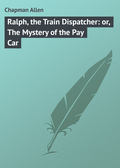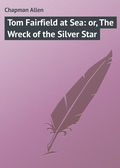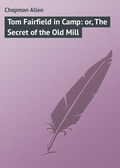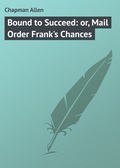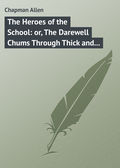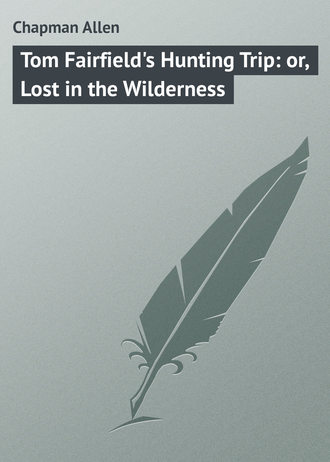
Chapman Allen
Tom Fairfield's Hunting Trip: or, Lost in the Wilderness
CHAPTER I
THE BIG SNOWBALL
“Well, Tom, it sure is a dandy plan!”
“That’s right! A hunting trip to the Adirondacks will just suit me!”
“And we couldn’t have better weather than this, nor a better time than the coming holiday season.”
Three lads, who had made the above remarks, came to a whirling stop on their shining, nickeled skates and gathered in a small ring about the fourth member of the little party, Tom Fairfield by name. Tom listened to what was said, and remarked:
“Well, fellows, I’m glad you like my plan. Now I think – ”
“Like it! I should say we did!” cried the smallest of the three lads grouped about the one in the centre. “Why, it’s the best ever!” and he did a spread eagle on his skates, so full of life did he feel that crisp December day.
“Do you really think we can get any game?” asked Jack Fitch, as he loosed his mackinaw at the throat, for he had warmed himself by a vigorous burst of skating just before the little halt that had ended in the impromptu vote of thanks to Tom.
“Get game? Well, I should say we could!” cried another of the lads.
“What do you know about it, Bert Wilson?” demanded Jack. “Were you ever up there?”
“No, but I’m sure Tom Fairfield wouldn’t ask us up to a hunter’s camp unless he was reasonably sure that we could get some kind of game. I’m not very particular what kind,” Bert went on, “as long as it’s game – a bear, a mountain lion, a lynx – I’m not hard to suit,” he added magnanimously.
“Well, I should say not!” laughed Tom.
“But say!” exclaimed the youngest member of the quartette – George Abbot by name. “Do you really think we can bag a bear? Or a lynx, maybe? Or even a fox? Are there really any big animals up there, Tom? What sort of a gun had I better take? And what about an outfit? Do you think – ”
Tom reached out and gently placed a gloved hand over the mouth of the questioner, thereby cutting off, for the time being, the flow of interrogations.
“Just a moment, Why, if you please,” he said, giving George the nickname his fellow students at Elmwood Hall had fastened on the lad who seemed to be a human question mark.
“Well, I – er – Buu – er – gurg – ”
But that was the nearest semblance to speaking that George could accomplish. His companions laughed at him. He finally made a sign that he would desist if Tom removed the hand-gag, and when this had been done, Jack proposed a little sprint down to one end of the small lake on which they were skating.
“No, we’ve had enough racing to-day,” declared Bert Wilson. “I vote Tom tells us more about this hunters’ camp, and what we expect to do there.”
“All right, I’m agreeable,” Jack said.
“Are they – ?” began Why, but a look from Bert warned him, and he stopped midway in his question. His chums well knew that if George once got started it was hard to stop him.
“Well, there isn’t so much to tell that you fellows don’t know already,” began Tom slowly. “In the first place, there are three hunters’ camps, not one.”
“Three!” exclaimed Jack and Bert, while George looked the questions he dared not ask.
“Yes. You see they belong to a party of gentlemen, a sort of camping club. The camps are about five miles apart, in the wildest part of the Adirondacks.”
“Why – three?” came at last from George. Really he could not keep it back any longer. Tom did not seem to mind.
“Oh, I suppose they wanted to change their hunting ground,” he answered, “and they found it easier to make three camps, or headquarters, than to come all the way back to the first one. And the club is pretty well off, so it didn’t mind the expense.”
“But you don’t mean to say we can use all three of ’em?” cried Jack, incredulously.
“That’s the idea,” Tom said. “We’re just as welcome to use all three camps as one. They’re all about alike, each with a log cabin, nicely fitted up, set in the midst of the big woods.”
“That’s jolly!” cried Bert.
“And aren’t the men themselves going to use them?” George wanted to know. Again he went unrebuked.
“Not this season,” Tom Fairfield explained. “The club is sort of broken up for the time being. Some of the men want to go, but they can’t get enough together to make a party, so they had to give up their annual holiday outing this year.
“A business friend of my father’s belongs to the club, and he mentioned to Dad that there was a chance for someone to use the camps. Dad happened to speak of it to me, and I – well, you can imagine what I did! I jumped at the chance, and now you know almost as much as I do about it.
“I’ll tell you later just where the camps are, and how we are to get to them. We want to get together and have a talk about what we’ll take with us. School closes here day after to-morrow, and then we’ll be free for nearly a month.”
“And won’t we have some ripping old times, though!” cried Jack.
“Well, I should say yes!” chimed in Bert.
“Tell you what let’s do, fellows!” broke in George. “Let’s go up to the top of that hill and have a coast. Some of our lads from Elmwood are there with the bobs, and they’ll give us a ride. I’ve had enough of skating.”
“So have I,” chimed in Jack.
“I’m with you,” agreed Bert, stooping to loosen his skates, an example followed by Tom Fairfield.
“I hope this snowy weather holds,” spoke Jack. “But are you allowed to shoot game when there is tracking snow?”
“I don’t just know all the rules,” said Tom, “but of course we will do what is right. I guess we’ll have plenty of snow in the mountains, and cold weather, too.”
“It’s getting warm here,” observed Bert. “Too warm,” for the variable New Jersey climate had changed from freezing almost to thawing in the night, and the boys were really taking advantage of the last bit of skating they were likely to have in some time.
There were not many besides themselves on the ice of the lake when they started from it, heading for the big hill not far away – a hill whereon the youth of Elmwood Hall, a boarding school near the Jersey state capital, had many jolly times.
When Tom Fairfield and his chums, talking about the camping and hunting trip in prospect, reached the hill, they found it deserted – that is, by all save a few small town boys with their little sleds.
“No coasting to-day,” observed Jack, ruefully.
“No, it’s getting too soft,” added Bert, digging his foot into the snowy surface of the hill. But the small boys did not mind that. With the big lads out of the way, smaller fry had a chance.
George Abbot picked up a handful of snow and rolled it into a ball. As he noticed how well it packed, he exclaimed:
“Say, fellows, another idea!”
“Ha! He’s full of ’em to-day!” laughed Jack.
“Get rid of it, Why,” advised Tom. “Don’t keep ideas in your system.”
“Let’s roll a whopping big snowball,” proposed George, “and send it down hill. It will roll all the way to the bottom, and pick up snow all the way down.”
“It will be some snowball when it gets to the bottom,” observed Tom. “This snow does pack wonderfully well,” he added, testing it.
“Come on!” cried George, and he started to roll the ball. In a few minutes he had one so large that it needed two to shove it about, and as it gathered layer after layer of snow, it accumulated in size until the strength of the four lads was barely sufficient to send it slowly along.
“Now to the top of the hill with it!” cried Tom, and it was placed on the brink. The boys held it at a point where it would not interfere with the small coasters. It was poised on the brink a moment.
“Let her go!” cried Tom.
“There she goes!” echoed Jack Fitch.
They shoved the ball down the slope. On and on it rolled, gaining in momentum and size with every bound.
“Look at it!” cried George. “Say, it sure is going!”
“And it’s getting as big as a house!” excitedly shouted Bert.
“It will roll all the way across the lake,” said Tom, for the frozen body of water was at the foot of the hill, and it did seem as though the snowball had momentum enough to carry it over the ice.
A moment later the ball was at the foot of the hill, and rolling along with increasing speed. And then, so suddenly that the boys were startled with fear, something happened.
Out on the ice drove a horse and a cutter, containing a man. He had left the road and taken a short cut across the ice. And now he was directly in the path of the immense, rolling snowball.
“Stop! Stop!” cried Tom Fairfield. “Look out!”
But it was too late to stop, even if the man in the cutter had heard him.
On rushed the great ball directly toward the horse and vehicle.
CHAPTER II
A SURPRISE
“Say, it’s going to hit him, sure as fate!” cried Tom.
“No help for it,” half-groaned Jack.
“And there will be some smash!” murmured Bert. “Oh, what did you do it for, George?”
“Me do it? Why, say, you fellows had as much to do with it as I did! I didn’t do it all!” and the smaller lad looked indignantly at his companions.
“Come on!” cried Tom, as he started on a run down the snowy side of the hill.
The others followed.
“We can’t do anything!” shouted Jack.
“Of course not,” agreed Bert. “By the time we get there – ”
He did not finish the sentence. All this while the big snowball had been rushing on. The man in the cutter had seen it, but too late. He tried to whip up the horse and get out of the way, but even as Bert spoke the mass of snow struck fairly between the horse and cutter.
In an instant the vehicle was overturned.
The boys, running to the rescue, had a confused vision of a man flying out to one side, head first, toward a snowbank. They also saw the horse rear up on his hind legs, struggle desperately to retain his balance and then, with a fierce leap, break loose from the cutter and run on, free, across the ice.
As the boys hastened on, they saw the man slowly pick himself up out of the snowbank, and gaze wonderingly about him, as if trying to fathom what had happened, whether it had been an earthquake or an avalanche. Indeed, so large was the snowball, and so strong was the force of it, for it had gained speed by the rush down the steep hill, that it really was a small avalanche.
The ball had split into several pieces on hitting the cutter, the shafts of which were broken and splintered, showing how the horse had been able to free himself.
“We’ll have to – to apologize,” murmured Tom, as he and his companions kept on toward the man who was now gazing down disconsolately at the ruin wrought.
“Yes, I guess we will,” agreed Jack. “We – why, Cæsar’s corn-plasters!” he cried. “Look who it is – Professor Skeel!”
“The old tyrant of Elmwood Hall!” murmured Bert. “Who’d have thought it?”
“Now we are in for it,” added Tom, grimly.
“Burton Skeel!” said George in a whisper as he caught sight of the angry-looking man, gazing at his smashed cutter and staring off over the ice in the direction taken by the runaway horse. “Skeel, the man who made so much trouble for Tom Fairfield. And we upset him! Oh – good-night!”
Those of you who have read the first volume of this series, entitled “Tom Fairfield’s Schooldays,” do not need to be introduced to Professor Skeel. The unpopular instructor of Elmwood Hall, where Tom and his chums attended, had been the cause of a rebellion, in which Tom was a sort of leader, and, later, a pacifier. Tom Fairfield, the son of Mr. and Mrs. Brokaw Fairfield, of Briartown, N. J., had made himself popular soon after coming to Elmwood, where he had been sent to board while his parents went to Australia about some property matters.
And now to find that the man upset from his cutter was this same unpopular teacher, Professor Skeel, was enough to give pause to any set of lads.
But Tom Fairfield was no coward. He proved that when the Silver Star was wrecked, an account of which you may read of in my second volume, called “Tom Fairfield at Sea,” for the days that followed the foundering of that vessel were trying ones indeed, and the dreary days spent in an open boat, when Mr. Skeel proved himself not only a coward, but almost a scoundrel, showed Tom fully what sort of a man the professor was.
Tom finally reached Australia, and set out on another voyage in time to rescue his parents from some savages on one of the Pacific islands. So it was such qualities as these, and those developed when Tom had other adventures, set forth in the third book, “Tom Fairfield in Camp,” that made our hero keep on instead of turning back when he found what had happened to Mr. Skeel.
In camp Tom and his chums succeeded in clearing up the mystery of the old mill, though for a time it seemed that they were doomed to failure. But Tom was not one to give up easily, and this, I think, was more fully shown, perhaps, in the volume immediately preceding this, called “Tom Fairfield’s Pluck and Luck.”
True, Tom did have “luck,” but, after all, what is luck but hard work turned to the best advantage? Almost any chap can have luck if he works hard, and takes advantage of every opportunity.
And now, after many weeks of tribulations, Tom found himself at the beginning of the Christmas holidays, and he and his chums had in prospect a very enjoyable time.
But just at the present moment they would have given up part of anticipated pleasures, I believe, not to have had the snowball accident happen.
“It is Skeel,” murmured Tom, as though at first he had doubted the evidence of his own eyes.
“Of course it is,” said Jack.
“And we’re in for trouble, or I miss my guess,” added Bert.
“I wonder what in the world he is doing in these parts?” came from George. “You thought you’d seen the last of him, didn’t you, Tom, after the wreck of the Silver Star?”
“I certainly did.”
“And yet he bobs up again,” went on George. “What does he want? Is he trying to get back on the faculty of Elmwood Hall?”
No one answered his questions, nor did Tom, or any of the others, rebuke Why for his queries. They had too much else to think about.
“Well, young men, well!” began Professor Skeel in his pompous voice. “Well, are you responsible for this?”
“I – I’m afraid we are,” said Tom. He did not add “sir,” as once he would have done. He had lost the little respect he had for the former teacher, and when a man loses the respect of a manly youth, it is not good for that man.
“Humph! Yes, you certainly have done mischief enough,” went on Mr. Skeel, in snarling tones. “My cutter is broken, I am thrown out, and may have sustained there are no telling what injuries, my horse has run away and may be killed, and you stand there like – like blithering idiots!” he cried, with something of his old, objectionable, schoolroom manner.
“We – we didn’t mean to,” said Tom.
“We just made a big snowball and rolled it down,” George said, determined to take his share of the blame.
“Hum! Yes, so I see – and so I felt, young men!” cried the irate man, as he brushed the snow off his garments.
The boys had not yet gotten over the surprise of identifying Professor Skeel. They could not understand it.
“We will do anything we can to make amends,” Tom said, slinging his skates over his shoulder with a jangling of steel. “We will try to catch your horse, and we can get you another cutter. We are – ”
Something in Tom’s voice caused the man to look up quickly. As he did so Tom noticed that his right ear appeared as though it had been recently injured. The lower part was torn and hung down below the other lobe.
“Ha! So it’s you, is it!” fairly snarled Mr. Skeel. “It’s you, Tom Fairfield?”
“Yes, Mr. Skeel. And I can only say how sorry I am – ”
“Don’t tell me how sorry you are!” interrupted the former teacher, in a voice filled with passion. “I don’t want to listen to you. I’ve had enough of you. Don’t you dare to address me!
“This was done on purpose. It was a deliberate attempt to injure me, perhaps kill me, for all I know. But I will not submit. I will at once go to town and cause your arrest, Tom Fairfield. The arrest of yourself, and those rascals with you. I’ll have you all arrested.”
George turned pale under his ruddy cheeks. He was not afraid, but he was thinking of the disgrace. But Tom Fairfield was master of the situation.
“Oh, I wouldn’t have anyone arrested if I were you, Mr. Skeel,” he said, in easy tones.
“Yes, I shall, too!” blustered the man. “I’ll have you all arrested! The idea of rolling a snowball on me and almost killing me. I’ll have everyone of you arrested.”
“Oh, I wouldn’t,” Tom said. “You forget that little matter of the forgery, Mr. Skeel. That indictment is still hanging over you, I believe. And if you were to go to the authorities, it might come out, and there would be some other arrests than ours. So if I were you – ”
He did not need to finish. Mr. Skeel turned pale and uttered an exclamation under his breath.
At that moment George created a diversion by crying:
“Here comes your horse back.”
CHAPTER III
THE PLOT
George Abbot was not exactly correct in saying that the runaway horse was coming back. The animal was being brought back, and he seemed quiet and docile enough. Perhaps he had lost his fright in the run he had taken after being freed from the cutter.
“Who’s leading the horse?” asked Bert Wilson, while Tom turned to look, after having faced the angry professor until the latter turned aside his head. Well he knew that Tom spoke the truth. A shady transaction, while a member of the Elmwood faculty, had placed Professor Skeel under the ban of the law, and he realized that he could not appeal to it without bringing himself into its clutches.
“That’s Morse Denton with the animal,” said Jack.
“Morse must have caught him before he went very far, or he wouldn’t be back so soon,” spoke Bert, waving his hand toward the former Freshman football captain.
“Does that horse belong there?” Morse called across the ice.
“Yes, bring him over here,” said Tom. “Perhaps we can patch up the shafts and send you on your way again, Professor Skeel,” Tom went on, for he did not hold enmity, and he was willing to let bygones be bygones, if the professor did not push matters too far.
“Um!” was all the answer the former teacher vouchsafed. He was arranging his garments, which had been rather twisted, to say the least, by his sudden exit from the cutter.
“What happened?” asked Morse, when he led the horse up to the little group standing partly on the ice of the lake and partly on the shore, for the accident had happened close to the edge.
“It was a big snowball,” volunteered George. “We rolled it down the hill, and Professor Skeel ran into it.”
“Be correct, young man. Be correct!” growled the former instructor. “The snowball ran into me, but I’ll have satisfaction. I’ll – ”
He caught Tom’s eye on him, and fairly quailed.
“Why, it’s Professor Skeel!” cried Morse. “Where did you – ”
But Tom gave Morse a quick and secret sign to cease questioning, and the newcomer, still holding the captured horse, acquiesced.
“Is the animal hurt?” demanded the former teacher.
“Doesn’t seem to be,” Morse replied. “I saw him coming at a slow canter across the ice, and I had no trouble in stopping him. I guessed it was a runaway and I started him back in just the opposite direction to that he was going. Then I saw you fellows,” he added to his chums.
“I have told Professor Skeel how sorry I am that the accident occurred,” went on Tom, “and I have assured him that we will do all that we can to repair the damage.” He was speaking slowly and with reserve, and choosing his words carefully.
“Repair the damage!” snapped the man.
“The shafts are all that seem to be broken,” proceeded Tom. “I know a farmer near here, and I’m sure he will lend you another pair of shafts for your cutter. The harness is not damaged, the cutter itself is all right, and the horse is not hurt. There is no reason why you should not continue your journey, Professor Skeel.”
“Well, do something then, don’t stand there talking about it!” burst out the irritated man.
Tom did not answer, and his chums rather marveled, for Tom was not the youth to take abuse quietly. But Tom realized that, through no fault of his own, Professor Skeel had been put to serious inconvenience, and it was no more than just that the lads should make good the damage they had unwittingly done.
“Let’s set up the cutter, fellows,” proposed Tom, after a pause, “and then we’ll see about getting another pair of shafts. We can’t use these, that’s certain.” They were splintered beyond repair.
The boys of Elmwood Hall were used to doing things quickly, especially under Tom’s leadership. In a trice the cutter was righted, and the robes and the scattered possessions of Professor Skeel were picked up and put into it. Then while Morse, George and Bert remained to adjust the harness on the now quieted horse, Tom and Jack went to a farmhouse near the lake to borrow a spare pair of shafts.
Tom knew the farmer, of whom he had often hired a team in the summer, and the man readily agreed not only to loan the shafts, but to adjust them to the cutter.
He made a quick and neat job of it, and soon the horse was once more hitched to the righted vehicle.
“There you are, Professor Skeel,” said Tom. “Not quite as good as before, but almost. You can keep on, and once more I wish to tell you how sorry I am that it happened.”
“Um!” sneered Mr. Skeel.
“You may not believe it,” Tom went on. “We did not see you coming until we had started the ball down hill, and then it was too late to stop it. We never thought anyone would cross the lake on the ice at this point, as no one ever does so.”
“I had a right to, didn’t I?” demanded the irate professor.
“A right, certainly,” agreed Tom. “But it is unusual. Teams go down on the lake about a mile farther on, and you would have been perfectly safe there.”
“Humph! I guess I can cross this lake where I please! And the next time you roll a snowball on me, I’ll – ”
“I told you,” said Tom, and his voice was cuttingly cool, “that we did not roll the ball on you. It was unintentional, but if you persist in thinking we did it purposely, we can’t help that. Now, is there anything more we can do for you?” and he looked about the snow to make sure all the contents of the cutter had been picked up and returned to it.
The professor did not answer, but busied himself getting into the vehicle, and taking the reins from Morse Denton.
“You can send them spare shafts back any time,” said the farmer who had kindly loaned them.
“We’ll pay for ’em if he doesn’t,” said Jack in a low voice, anxious to preserve peace. “It’s getting off cheap as it is,” he added.
“That’s right,” agreed Bert. “I thought he’d raise no end of a row.”
“So he would have – only for Tom. Tom closed him up in great shape, didn’t he?”
“He sure did.”
Without a word of thanks, Professor Skeel drove off over the ice. He never looked back, but the boys could hear him muttering angrily to himself, probably giving vent to threats he dared not utter aloud.
“I wonder what he is doing in this neighborhood?” ventured Bert.
“It’s certainly a puzzle,” admitted Tom Fairfield. “He’s up to no good, I’ll wager.”
“That’s right,” agreed Jack. “Well, I’m glad he’s gone, anyhow. That sure was some upset!”
“Say, did you notice his ear?” asked George. “It wasn’t that way when he was teaching school here. Looks as if a knife had cut him.”
“Was his ear like that when he was shipwrecked with you, Tom?” asked Bert.
“No. That’s a new injury,” was the answer. “Rather a queer one, too. He might have been in a fight.”
The lads remained standing together, for a little while, gazing at the now fast-disappearing cutter and its surly occupant.
“Well, let’s get back to school,” proposed Jack. “It will soon be grub-time.”
“And Tom can tell us more about that hunting trip,” suggested Bert.
“All right,” agreed our hero, but as he walked along he was puzzling his brain, trying to think what Professor Skeel’s object was in coming back to Elmwood Hall.
Perhaps if Tom could have seen Mr. Skeel a little later, as the cutter drew up at a road-house some miles away – a road-house that did not have a very enviable reputation in the neighborhood – Tom would have wondered still more over his former teacher’s return.
For, as the cutter drew up in the drive, there peered from a window two men, one with a more evil-looking face than the other, which was his only claim to distinction.
“There he comes,” murmured the man with the less-evil countenance.
“Yes, but he’s late,” agreed the other. “Wonder what kept him?”
“He looks mad – too,” commented his companion.
A few moments later Professor Skeel entered the rear room of the road-house. The two men arose from the table at which they had been sitting.
“Well, you kept your word, I see,” muttered Skeel to the man with the evil face. “You’re here, Whalen. And you too, Murker.”
“Yes. We’re here, but you didn’t say what you wanted of us,” spoke the one addressed as Whalen.
“You’ll know soon enough,” was the rejoinder. “We sha’n’t want anything – at least not for a while,” Mr. Skeel went on to the landlord, who had followed him into the room. “You can leave us alone. We’ll ring when we want you. And close the door when you go out,” he added, significantly.
The landlord grunted.
“Well, now, what’s the game?” asked Whalen, when Mr. Skeel had seated himself at the table.
“Revenge! That’s the game!” was the fierce answer, and a fist was banged down on the table. “I want revenge, and I’m going to have it!”
“Who’s the party?” demanded Murker.
“Someone you don’t know, but whom you may soon. Tom Fairfield! I owe him a long score, but I’m going to begin to pay it now. I want you to help me, Whalen.”
“Oh, I’ll help you quick enough,” was the ready answer.
“He was instrumental in having you discharged from Elmwood Hall, wasn’t he?” went on the former instructor.
“That’s what he was.”
“Something about beating one of the smaller boys, was it not?” and Skeel smiled in a suggestive way, as though he rather relished, than otherwise, the plight of Whalen.
“Naw, I only gave the kid a few taps ’cause he threw a snowball at me,” the discharged employee went on, “but that whelp, Fairfield, saw me, and complained to Doc. Meredith. Then I was fired.”
“And you’d like a chance to get even, wouldn’t you?”
“That’s what I would!” was the harsh answer.
“Well, I want to square accounts with him also, and, at the same time, make a little money out of it. I thought you and Murker could help me, and that’s why I asked you to meet me here. I’m a bit late, and that’s some more of Fairfield’s doings. Now to business. This is the game!”
And the three plotters drew their chairs closer together and began to talk in low, mumbling voices.



